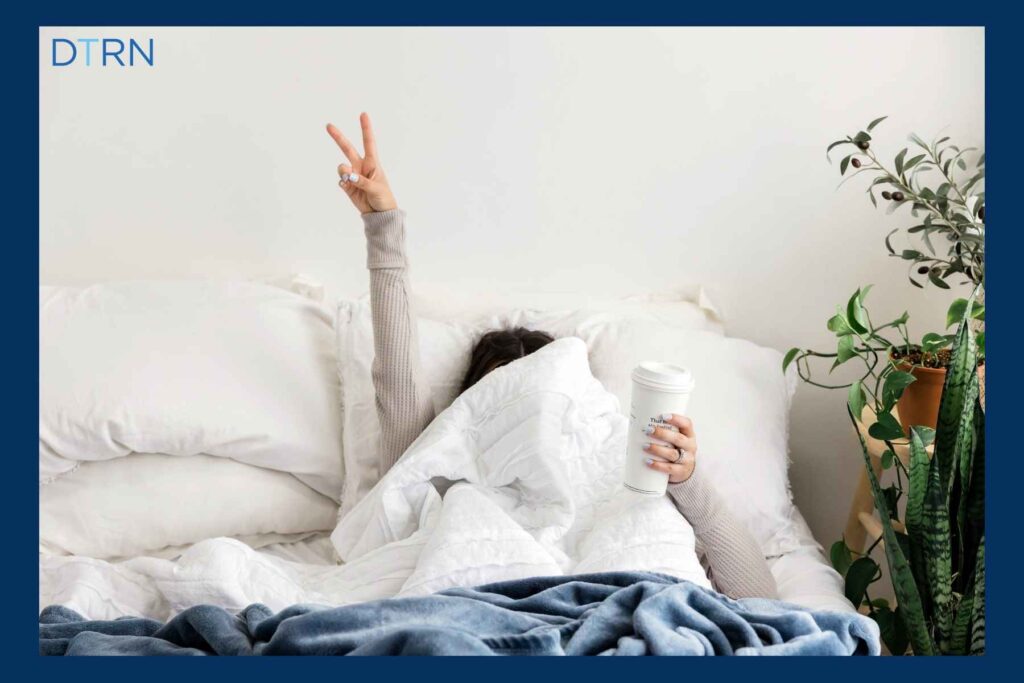The Benefits of Sleep for Your Skin, Hair, and Nails

There are numerous benefits of sleep, including helping your skin look its best…
We often make up stories about the fountain of youth and the quest for it. However, when it comes to your beauty routine and skin, sleep is the closest thing we have to the forever sought after fountain of youth.
Nurse Practitioner and Professional Injector Donna Lucarini shares, “Adults should get 7 to 9 hours of sleep per night. Sleep powers your mind and restores your body,” Lucarini continues, “Sleep hygiene is so important because it allows for your body to rest and restores your entire mind-body system, which includes your skin. Research is even now showing that a lack of 7 to 9 hours of quality sleep per night is tied to difficulty in losing weight for some patients.”
For those getting less than 6 hours of sleep per night, it’s a sure bet that the lack of sleep is affecting their appearance. Even getting just one more hour of sleep at night could mean you see some improvement in your skin in just 24 hours. Within 2 to 3 weeks, if you’re getting an extra 1 to 3 hours of sleep per night, not only you will notice the improvement, but others will, too.
What are the benefits of sleep for your skin?
Getting an adequate amount of quality sleep helps to turn back the hands of time for our skin. During sleep, our bodies produce collagen due to human growth hormone that’s released while we’re sleeping. Collagen helps keep our skin looking healthy, with fewer noticeable lines and wrinkles. The benefits of sleep for your skin includes:
- Fading wrinkles and signs of aging
- More hydrated skin
- Lowers risks of acne
- Stronger nails, healthier hair, and healthier skin
- Reduced bags under the eyes
- A healthier and brighter complexion
Fading Wrinkles and Signs of Aging
Getting only 4 to 5 hours of sleep per night can lead to twice as many lines and wrinkles as sleeping 7 to 9 hours would. Collagen production while you sleep reduces the appearance of fine lines and wrinkles and prevents sagging.
More hydrated skin
Getting enough sleep allows the body to hydrate. A lack of sleep, on the other hand, can leave your skin drier, making lines and the signs of aging more visible.
Lowers risks of acne
Similar to how our bodies and minds can get stressed when we experience a lack of sleep, our skin can get stressed, as well. Acne is one of the first tall tale signs that our skin is stressed. However, with the right amount of restful sleep each night, our skin has the opportunity to regenerate. The result? A clear complexion and glow.
Stronger nails, healthier hair, and healthier skin
You might not realize it, but a solid night’s sleep helps maintain and balance your body’s natural moisture distribution. Cells that are hydrated produce more collagen, which makes your skin glow, your hair look healthier, and your nails stronger.
A Healthier and Brighter Complexion
When you sleep, you blood flow increases, which is great for your skin, since proper blood flow leads to a brighter complexion and healthier glow. Conversely, sleep deprivation can lead to a reduction in blood flow to your face, meaning skin looks lifeless and lacks luster leading to dullness.
Reduced Bags Under the Eyes
Virtually every adult has woken up at least once with bags or dark circles under their eyes following a night of too little sleep. In fact, puffy eyes are one of the first signs on not getting enough sleep when you look in the mirror each morning. With the necessary amount of shut-eye, however you’ll see less under eye puffiness.
Lucarini shares, “It can also help to reduce swelling if drink plenty of water and use an extra pillow to elevate your head while you sleep.”
Also, as mentioned in the previous section, blood flow increases while you sleep. When you aren’t sleeping, blood can collect and become visible under the eyes, making dark circles more visible. Lack of sleep can also make under-eye issues due to age, genes, and increased melanin worse.
What if you’re having trouble sleeping?
Ok, so maybe you’re clear that getting enough sleep is essential for your overall wellbeing, including having beautiful, glowing skin. But what happens when you’re doing your best but find you’re not sleeping well?
Lucarini shares the following sleep hygiene tips:
- Get fresh air and exercise daily, preferably in the first few hours after sunrise. Being physically active during the day can help you fall asleep more easily at night.
- Eat dinner by 7:00 PM, and finish meals three hours prior to bedtime. Dinner should be lighter in quantity and higher quality than lunch since the digestive process is weaker and less efficient in the evening. A heavy dinner is difficult to digest. A full stomach is a significant factor in esophageal reflux disease and isn’t conducive to sleep. A short, casual walk after dinner supports proper If you tend to munch after 7:00 PM, think about just having a light, healthy snack, like cucumber spears or celery.
- Avoid consuming caffeine in the afternoon or evening. Reserve it for the morning hours.
- Avoid consuming alcohol close to Alcohol can cause your blood sugar to drop, causing you to wake up and getting unrestful sleep.
- Reduce your intake of fluids before bedtime. This will help to ensure you’re not waking up to go to the bathroom.
- Take a nice bath before bed. Consider adding some relaxing essential oils, like lavender, to help you relax and rest more peacefully.
- Be consistent with your bedtime routine and habits. Go to bed at the same time each night and get up at the same time each morning, including on the weekends. It’s best to have lights out by 10:30
- Make sure your bedroom conducive to sleep. It should be quiet, dark, relaxing, and at a comfortable temperature for sleep.
- Use your bed only for sleep and sex.Other activities can distract from a peaceful night’s sleep.
- Remove electronic devices. Remove TVs, computers, and smart phones from the bedroom and no electronic devices at least 30 minutes before bedtime. Also, avoid watching the news or action movies. You are unlikely to hear or see anything soothing by watching those.
- Consider keeping fresh flowers in the home, especially in the bedroom. This simple step can help to boost the mood and support the air quality.
- Workout in the morning. If you work out in the evenings and are struggling with sleep, consider changing your exercising to the morning or early afternoon, instead.
What factors impact your ability to sleep?
There are several contributing factors that can impact one’s ability to sleep. Some include
- Health conditions, like asthma, acid reflux, or heartburn
- Certain medications and supplements
- Caffeine
- Pain and injury
- Anxiety
- Stress
- Substance abuse
- Alcohol
- Untreated sleep conditions, such as insomnia and sleep apnea
- Exercising close to bedtime
- Jet lag
- Having irregular work shifts
Could a lack of sleep be linked to your hormones?
Hormones could also be the issue. Sometimes, a hormonal imbalance can impact our quality and ability to sleep. Lucarini points out, “I see a lot of both women and men come to me with complaints of extreme fatigue, brain fog, lack of libido, and poor sleep. A hormonal imbalance may contribute to these symptoms. A full lab panel to include estradiol, FSH, and testosterone identifies if there is a hormone deficiency.”
In particular, testosterone deficiency may have a deleterious effect on sleep quality that may be improved with testosterone replacement.
Lucarini suggests bioidentical hormone replacement therapy (BHRT) if you find your hormones are imbalanced. “Bio identical hormones are identical to our own hormones. Pellet therapy are pellets that are implanted under the skin with a simple in office procedure. The pellets last between 3 to 4 months for women and 4 to 5 months for men. Since bioidentical hormones are implanted under the skin and are not taken orally, they do not pass through the liver, thus eliminating concerns of any blood clotting as reported with oral hormones.”
For both men and women, BHRT options are available. Pellets are the option to implant under the skin. Depending on whether a woman is post-menopausal or not will dictate whether she is a candidate for estradiol; however, testosterone replacement is a hormone for both men and women. Women need testosterone too. A recent study finds that testosterone optimization has been shown to reduce the incidence of invasive breast cancer in women.
What skin care products benefit your skin while you sleep?
There are several sleep creams and products available. But which are reliable and best to support your skin while you sleep?
“SkinMedica has a wonderful product line to address skin care needs,” Lucarini shares, “One product I highly recommend to use at night is the Lumivive System. It is a two part system. In the evening, it recharges your skin and improves that ability to repair itself as you sleep. During the days, it protects against pollution and blue light aggressors.”

What are additional benefits of sleep?
In addition to helping the skin look its best, adequate sleep provides several other benefits:
- Allows you to think more clearly, leading to optimal performance at work or school
- Reduces the number of times you get sick
- Improves mood
- Reduces stress
- Allows you to make better judgement calls to improve safety and avoid injuries
- Lowers your risk for serious health condition, including heart disease, obesity, and diabetes
- Helps you maintain a healthy weight
Sleep matters for overall health and wellbeing
It’s clear that the benefits of sleep are many–sleep matters when it comes to our wellbeing. If you want to look and feel your best, ensure you’re taking proper care of yourself and getting enough sleep at night. If you are struggling with getting enough sleep after enacting the sleep hygiene tips above, consider working with a professional medical provider to determine the root cause of your sleep challenges. Your discussion might warrant having your hormones tested through a blood draw, in addition to other diagnostic tests that can help to rule out sleep disorders and other possible underlying problems.
Donna Lucarini, MSN, APRN, FNP-C
Donna Lucarini is a Houston-based Nurse Practitioner and Advanced Practice Nurse at DermaTouch RN with a B.S. in Nursing from UT Health Science Center Houston, a Master’s from Chamberlain College of Nursing, and a B.S. in Psychology from Sam Houston State University.
Donna finds her work in women’s health most enjoyable, whether it be in preventative medicine or cosmetic care, with a compassionate perspective to help her patients look and feel their best. Donna works with both male and female patients to provide bioidentical hormone replacement therapy and injectable cosmetic treatments, like dermal fillers and Botox. Learn more about Donna and the team of professionals she works with.
DermaTouch RN offers minimally invasive and non-invasive treatments for men and women in Houston, San Antonio, Spring and Cypress, as well as the surrounding areas of Texas. We are the largest aesthetic practice in the Houston area, and all of our medical spa treatments are performed by a team of nurse practitioners, registered nurses, and aestheticians who receive continuing education to remain abreast of emerging treatments that benefit our patients. We invite you to learn more about our office before your consultation.




